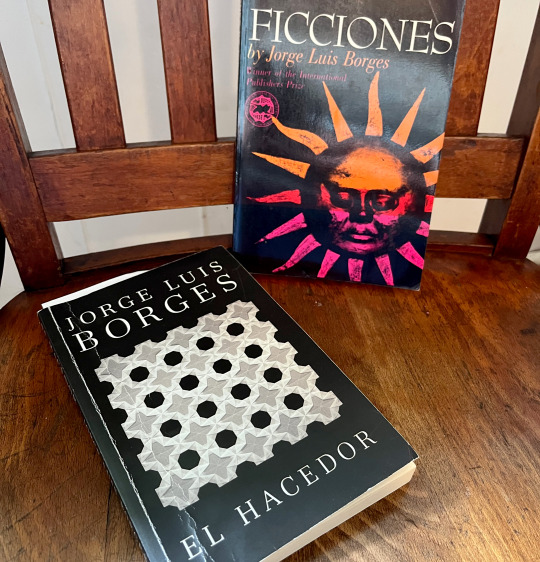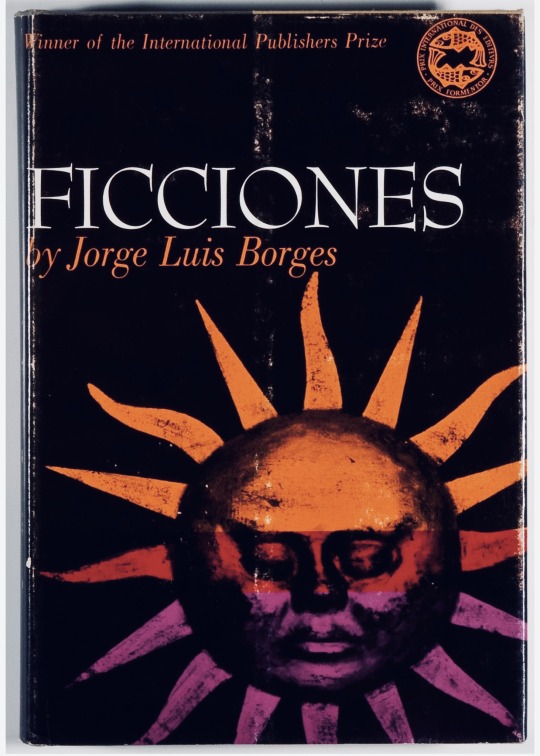#Ficciones
Text

Cover art for Ficciones (Fictions), Jorge Luis Borges, c. 1940s-50s
To a cat
Mirrors are not more wrapt in silences
nor the arriving dawn more secretive;
you, in the moonlight, are that panther figure
which we can only spy at from a distance.
By the mysterious functioning of some
divine decree, we seek you out in vain;
remoter than the Ganges or the sunset,
yours is the solitude, yours is the secret.
Your back allows the tentative caress
my hand extends. And you have condescended
since that forever, now oblivion,
to take love from a flattering human hand.
You live in other time, lord of your realm —
a world as closed and separate as dream.
Jorge Luis Borges, trans Alastair Reid, 1977
A Un Gato
No son más silenciosos los espejos
ni más furtiva el alba aventurera;
eres, bajo la luna, esa pantera
que nos es dado divisar de lejos.
Por obra indescifrable de un decreto
divino, te buscamos vanamente;
más remoto que el Ganges y el poniente,
tuya es la soledad, tuyo el secreto.
Tu lomo condesciende a la morosa
caricia de mi mano. Has admitido,
desde esa eternidad que ya es olvido,
el amor de la mano recelosa.
En otro tiempo estás. Eres el dueño
de un ámbito cerrado como un sueño.
Jorge Luis Borges
#art#photography#cover art#jorge luis borges#borges#fictions#black and white#ficciones#1940s#1950s#cats#poetry#to a cat#argentinian writers#books#short stories#writing#penguin#penguin modern classics
78 notes
·
View notes
Text

113 notes
·
View notes
Photo

“Ficciones”, de Jorge Luis Borges en la Línea A.
#ficciones#jorge luis borges#borges#escritores#literatura#literatura argentina#argentina#buenos aires#book recommendations#lectores#instabooks#books#book#books books books#more books#more books please#booksbooksbooks#books on boooks#bookporn#bookpic#bookphoto#bookcover#bookhaul#bookhunter#book hunter#book with me#reading#la gente anda leyendo#leyendo#currently reading
34 notes
·
View notes
Photo

I wrote my thesis largely on short stories from this book by Borges. It was amazing to reread them in his city.
#jorge luis borges#bookish love#ficciones#fictions#buenos aires#reading while wandering#reading while wandering abroad#reading while wandering argentina
79 notes
·
View notes
Text
Round 1
Info post Ficciones
Info post Angola y otros cuentos
#Ficciones#Angola y otros cuentos#latam classic lit polls#literature#literatura#classic lit#bracket#classic lit bracket#classic literature#round 1
12 notes
·
View notes
Text

From Jorge Luis Borges’s Ficciones
9 notes
·
View notes
Quote
Fame is a form, perhaps the worst form, of incomprehension.
Jorge Luis Borges, Ficciones
67 notes
·
View notes
Text
My top books I read in 2023:
1: Sirens of Titan (Kurt Vonnegut) - I love Vonnegut’s writing so much, and Sirens is such a great narrative on free will and loving whoever is around to be loved. (Plus chrono-synclastically-infundibulated is just fun to say)
2: Invisible Man (Ralph Ellison) - already a book about important social issues that are still incredibly relevant today, Ellison’s style portrays a lifelike picture of the politics of race in America.
3: Midnight’s Children (Salman Rushdie) - The language and style of this book make it a delight to read as Rushdie paints an incredible mural across a canvas of Indian historical events interwoven with the supernatural to create an amazing story.
4: Job, A Comedy of Justice (Robert Heinlen) - Excellent satire of fundamentalist religion, packed with jokes and reality shifts, a complex world that goes from Mexico to Kansas to heaven to hell has a lot to say about religion.
5: The Master and Margarita (Mikhail Bulgakov) - The Devil and his entourage cause chaos in Soviet Moscow, in addition to a narrative about Pontius Pilate. An excellent and absurd premise sets up a criticism of humanity but also a defense of it, both in Judea 2000 years ago and now.
6: Ficciones (Jorge Luis Borges) - While the writing can be dense, so much is packed into these short stories parsing the meaning is definitely worth it. Fantastical scenarios act as mirrors to reality and each story leaves just enough to the readers imagination to make it a compelling and thought provoking work about the labyrinthine ways of reality.
7: Things Fall Apart (Chinua Achebe) - I love novels you can get lost in, and such a rich portrayal of Igbo life easily lends itself to a complex world that many people failed to see about Africa. Important social issues are dealt with and both extreme ways of living are critiqued in a compelling narrative.
8: Bluebeard (Kurt Vonnegut) - A coming of age a going of age and the Armenian diaspora are explored through the life of Abstract Expressionist artists and what it has to say about culture, society, and gender roles. You have to keep reading to see what’s in the potato barn, and when all is revealed it makes a lot of sense for Vonnegut.
9: Kafka on the Shore (Haruki Murakami) - So much happens in the book you are riveted as the chapters bounce between characters. An excellent hook grabs you in and doesn’t let you go. Murakami’s imagination runs wild and this strange reinterpretation of oedipus makes you think.
10: Cat’s Cradle (Kurt Vonnegut) - Newt Hoenikker said it best - “no damn cat, and no damn cradle.”
#books#booklr#bookblr#books and reading#book review#reading#kurt vonnegut#sirens of Titan#ralph ellison#invisible man#salman rushdie#midnight’s children#master and margarita#mikhail bulgakov#job a comedy of justice#Robert Heinlen#ficciones#jorge luis borges#bluebeard#things fall apart#chinua achebe#kafka on the shore#haruki murakami#cats cradle
3 notes
·
View notes
Text

4 notes
·
View notes
Text

Reading Borges this week and it's making me happy. <3
2 notes
·
View notes
Text
“ Forse siamo prigionieri del passato e questo ci impedisce di sciogliere i nodi della vita reale. È un conflitto che fu emblematicamente descritto da Friedrich Nietzsche nella seconda delle sue Considerazioni inattuali, quella Sull'utilità e il danno della storia per la vita. Nietzsche propose allora un elogio della smemoratezza. «Immaginate – scrisse – l’esempio estremo, un uomo che non possedesse punto la forza di dimenticare […] un uomo simile […] quasi non oserebbe piú alzare il dito. Per ogni agire ci vuole oblio: come per la vita di ogni essere organico ci vuole non soltanto luce ma anche oscurità». Jorge Luis Borges ha dato consistenza fantastica al profilo ipotetico del titolare di una memoria totale e incancellabile, quella del suo «memorioso». Piú vicina alla nostra realtà è la memoria artificiale capace di immagazzinare in piccolissimo spazio una quantità illimitata di dati e di testi. Ma se ci accostiamo alle istituzioni deputate da secoli a conservare dati in prevalenza cartacei quali sono gli archivi inventati dai poteri politici e amministrativi, ne scopriamo un aspetto interessante, quello della selezione in ingresso del materiale da accogliere e della periodica revisione in uscita di quello da conservare. L’operazione è necessaria per arginare l’effetto distruttivo dell'afflusso massiccio e continuo di documenti. Perciò si ricorre periodicamente all'operazione dello scarto. Si tratta di una selezione regolata da norme e affidata in sostanza al criterio della utilità ipotizzabile dei documenti per l’amministrazione pubblica ma anche per la ricerca storica. È un criterio che lascia margini inevitabili all'arbitrio. È difficile prevedere i mutamenti futuri sia nelle esigenze conoscitive dell'amministrazione pubblica sia nelle curiosità degli studiosi. Per fare un esempio dei problemi che si presentano in questo campo, si è imposta in tempi recenti la cancellazione dei cosiddetti dati sensibili. E cosí si perde la possibilità di risalire ai nomi personali, impedendo agli storici futuri la possibilità di sfruttare appieno la straordinaria ricchezza dei dati anagrafici, per i quali gli archivi italiani vantavano il maggiore e piú antico patrimonio esistente.
Cosí vediamo come nella realtà accanto a quella del ricordare ci sia un’altra funzione comune alla memoria e alla storia: quella del dimenticare. Come nella selezione dei dati da conservare cosí anche nel lavoro dello storico ha sempre avuto gran parte l’individuazione di ciò che si deve raccontare. Da questo punto di vista la storia si può definire una macchina per dimenticare. Lo strato del ricordato e del ricostruito vi galleggia come una sottile zattera sull'oceano del dimenticato. La si potrebbe considerare l’equivalente dello strato del rimosso che nella memoria individuale nasconde una gran quantità di ricordi. Ora, è pur vero che quello che si riesce a riscattare dal passato ne è una parte minima. Ma è di questi affioramenti che si sostanzia da un lato la memoria come facoltà umana e dall'altro la storia come deliberata immersione nelle profondità del dimenticato. “
Adriano Prosperi, Un tempo senza storia. La distruzione del passato, Giulio Einaudi editore (collana Vele); prima edizione: 19 gennaio 2021. [Libro elettronico]
#Adriano Prosperi#letture#leggere#saggistica#saggi#storia#Un tempo senza storia#tempo#memoria#vita reale#ricordi#Friedrich Nietzsche#computer#documenti#arbitrio#archivi#Jorge Luis Borges#scarto#Ficciones#Artificios#ricordare#Funes el Memorioso#ricerca storica#dati sensibili#umanità#intellettuali contemporanei#meditazioni#smemoratezza#dati#memoria artificiale
19 notes
·
View notes
Text
“Quizá me engañen la vejez y el temor, pero sospecho que la especie humana está por extinguirse y que la Biblioteca perdurará: iluminada, solitaria, infinita, perfectamente inmóvil, armada de volúmenes preciosos, inútil, incorruptible, secreta.”
La biblioteca de Babel - Ficciones - Jorge Luis Borges
#books#libros#clasics#clasicos#quotes#frases#library#biblioteca#jorge luis borges#literature#literatura#literary quotes#frases literarias#ficciones#la biblioteca de babel
8 notes
·
View notes
Text
¿Qué se sentiría tocar el tiempo con las manos?
Mi abuela siempre dijo que uno mide el tiempo en su unidad favorita a utilizar. Que ella lo medía de acuerdo a el número de veces que daba vuelta a su vinil favorito de los panchos. Ese con el que tejía todos nuestros suéteres y nos preparaba los desayunos.
Cada lado disponía de cinco canciones de unos cuatro minutos cada uno. Los grandes boleros que con sus armonías y requintos la remontaban a otros tiempos.
Antes de que falleciera aprendí a tomar el tiempo como ella misma me enseñó. Sin embargo al ver yo su foto en el servicio funerario fue donde perdí la total noción del tiempo. Después de eso solo existió ese espacio en blanco entre mis oídos con el que sobrellevaba mis días.
Y así fue durante toda mi educación primaria. El maestro de sexto grado hacía saberle a mi padre lo poco interesado que estaba yo en mis estudios. Siempre sentado en el pupitre buscando excusas para no ver a nadie a los ojos, viendo siempre la forma de escapar, de tener un momento a solas para pensar en mi abuela.
Así me gradué, bajo el cobijo de un espectro inamovible y con la nostalgia como mi reloj de bolsillo.
//En imagen: Tepoztlan Junio 2022

4 notes
·
View notes
Photo

I wrote my thesis on some of the short stories in Ficciones by Jorge Luis Borges, translated by Andrew Hurley, but it's now been a few years since I read them. So I was due for a reread. And what better time to read Borges than while in Buenos Aires, his own beloved city, his own world of labyrinthine streets and old bookshops?
I read Ficciones while walking through los bosques de Palermo. I read it over a submarino on a just-ok day in El Calafate. And I finished it on an estancia, surrounded by mountains and beautiful horses and twisting paths.
These short stories never stop hitting. You never quite lose your thesis, and even rereading them now, I kept getting ideas. If I ever go back to grad school, I could go straight back to Borges and his ideas about creation and reading and what it means to try and put something out into the world. I love his twisty wild brain, and it was so cool to dig back into it in Argentina.
#ficciones#jorge luis borges#books in translation#translated literature#argentine literature#reading while wandering argentina#my book reviews#reread
28 notes
·
View notes
Text
Ficciones - Jorge Luis Borges
Ficciones es un libro de cuentos escrito por Jorge Luis Borges, publicado en 1944 y compuesto de dos partes: El jardín de senderos que se bifurcan y Artificios; posee dos prólogos. La crítica especializada ha aclamado esta obra suya como uno de los libros que ayudaron a definir el rumbo de la literatura universal del siglo XX. Asimismo, su publicación en 1944 colocó a Borges en un primer plano de la literatura universal. Fue incluida en la lista de las 100 mejores novelas en español del siglo XX del periódico español «El Mundo», así como también en la lista de los 100 libros del siglo XX del diario francés «Le Monde» y en los 100 mejores libros de todos los tiempos del Club de libros de Noruega.
Lee más sobre este libro en Wikipedia.
Ficciones - Jorge Luis Borges
Ficciones (in English: "Fictions") is a collection of short stories by Argentine writer and poet Jorge Luis Borges, originally written and published in Spanish between 1941 and 1956. Thirteen stories from Ficciones were first published by New Directions in the English-language anthology Labyrinths (1962). In the same year, Grove Press published the entirety of the book in English using the same title as in the original language. "The Approach to Al-Mu'tasim" originally appeared published in A History of Eternity (Historia de la eternidad) (1936). Ficciones became Borges's most famous book and made him known worldwide.
Read more about this in Wikipedia.
11 notes
·
View notes
